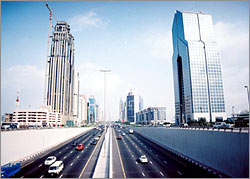Dubai eyes chance to be financial centre
Dubai’s new International Financial Centre has real ambition, but not the kind of backers it needs so far – particularly if it wants to open to the world by the end of May
Dubai International Financial Centre backers are preparing for business by the end of May, by which time the United Arab Emirates’ federal authorities are likely to have passed laws allowing the establishment of financial free zones.
 |
|
Dubai’s high skyline, symbolic of its |
The DIFC was created with the vision of positioning Dubai as a universally recognized hub for institutional finance – as the regional gateway for capital and investment. It hopes to serve as a financial nexus between Europe and Asia, and allow companies to operate regionally and globally with competitive advantages in Dubai.
The DIFC may enable corporations to serve their business interest in the Gulf Cooperation Council countries, the Indian Subcontinent, the Gulf, the Caspian states, the Levant, and north and east Africa with greater efficiency and effectiveness – ambition is sky high.
The DIFC will focus on four key areas – asset management, Islamic finance, regional financial exchange, and re-insurance, but preparations have not all been plain sailing.
Only three financial institutions have signed up to date, the DIFC still has a lot of work to do if it hopes to rival the established global exchanges in New York, London and Hong Kong.
DIFC’s Chairman Anis Al-Jallaf (also CEO of Emirates Bank International) and Regulatory Council chief Ian Hay Davison (a former Lloyd’s of London chief executive) have been travelling extensively of late, drumming up interest for becoming the region’s missing financial centre.
Traditionally, the Emirates have aimed solely at the Islamic finance market, but with the focus broadening to eventually include asset management, capital markets, reinsurance and institutional finance – the target appears to be a regional stock exchange allowing major Gulf companies to raise capital.
“We’ve got a regional, not a local ambition. We intend to be a financial hub licensing world-class players. There are 150 companies in the region as large or larger than Emirates Airlines with no local listing,” says Hay Davison.
“Some of the top reinsurance companies are very keen to get on board once we’ve opened the doors, as reinsurance currently has no home in the region,” said Jallaf.
Until now, Bahrain has been the home of Arab Reinsurance Group (ARIG), so the stage looks set for some major competition – but Bahrain will take some beating, particularly as they have Deutsche Bank and Julius Baer as sponsors.
Jallaf indicated that DIFC was ready to take on anyone. “We’re in competition with any market – though what we want to do is completely different to what anyone else in the Middle East is doing,” he said. “We are not an offshore haven [i.e. Bahrain]. We will tax – but at a rate of 0% fixed for 50 years.”
Dubai’s preparations for the International Finance Centre is a major move in the inter-Emirate rivalry with Abu Dhabi. Emirates Airlines seems to be enjoying relative success over Abu Dhabi’s troubled Gulf Air, and Abu Dhabi’s failed Saadiyat Island initiative has allowed Dubai’s leading financiers to steal Abu Dhabi’s thunder.
Local bankers are not so reserved, more resigned – to the inevitable loss of business . “It’s an opportunity for the Emirates and we have to cheer the efforts that have been made. It’s a case of coming to terms with globalisation – recognising the importance of accessing capital from foreign market.”
Hay Davison said local banks had little to fear as DIFC would focus on wholesale banking and “there will still be a need for a local retail market”. Jallaf promised there would be co-listings with the Dubai Financial Market.
DIFC’s free zone status affords it advantages. It will be largely immune to federal regulation, with its own rules and regulatory agency. But there are problems with credibility, including Dubai’s reputation for money-laundering – backer’s for the Centre have pushed for strong regulation, but concerns remain about DIFC’s Regulatory Council being packed with former City heavyweights – hired by a board of directors who are all friends with Dubai’s banking fraternity.